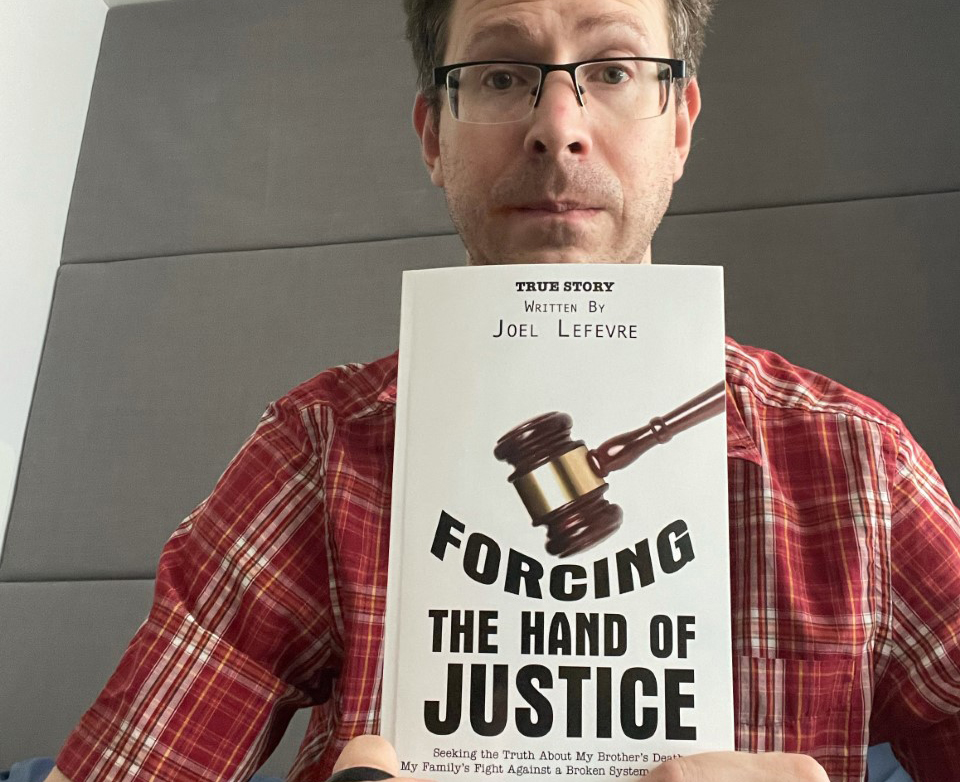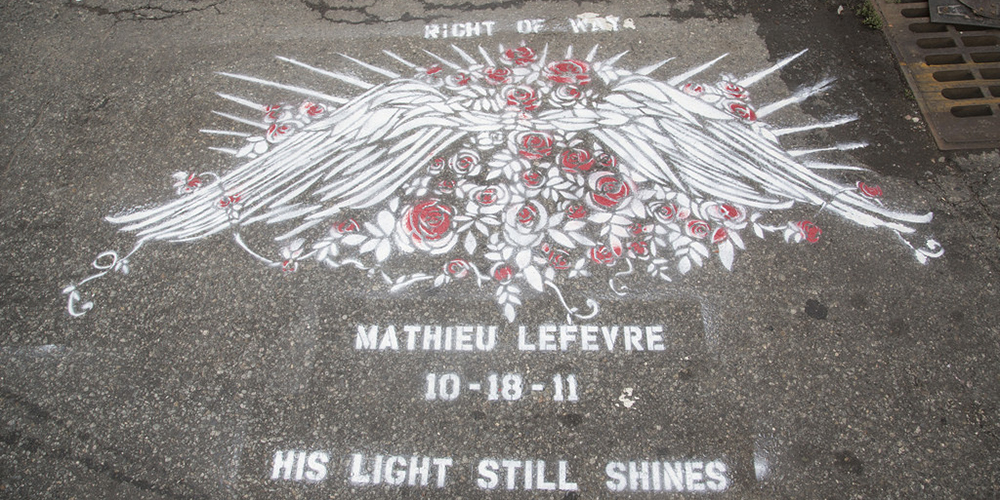Alumnus’ book acts as process of healing, advocates for individual power in judicial system
Sydney Tancowny - 18 October 2021

On April 19, 2021, Augustana alumnus Joel Lefèvre published the book he worked and gathered information on for almost a decade—Forcing the Hand of Justice: Seeking the Truth About My Brother’s Death and My Family’s Fight Against a Broken System (the NYPD).
While currently working as a drama instructor in Surrey, BC, Joel grew up in the hamlet of New Sarepta, AB. With only a small number of children his age in the area, Joel’s siblings—which included his older brother, Mathieu—became his closest friends.
Growing up, Mathieu would continuously push Joel out of his comfort zone, encouraging him to participate in social activities and supporting Joel through successes and challenges. “He was someone I knew I could always depend on and relate to,” said Joel. “Encouragement meant more from him than it did coming from other people because, as my brother, he saw me at my very best and he also saw me at my very worst.”
In their professional lives, Joel and Mathieu would both go on to pursue artistic careers. After graduating from Augustana Campus in 2005, Joel attended an acting program in New York City. Following the few years he spent living and working as an actor in the city, he pursued his second passion by taking a broadcast journalism certificate course in Saskatoon, SK.
While Joel turned to drama and broadcast journalism, Mathieu explored the visual arts, studying at Laval University and Université du Québec à Montréal. Mathieu would come to make a name for himself in Montréal and New York City, with more than 20 solo exhibitions and 30 group exhibitions around the world.

In 2011, during Mathieu’s time in New York, Joel moved back home to start a broadcasting job in Edmonton. It was during this time when Joel watched two police cars pull up the gravel road to the Lefèvre acreage.
“I assumed they were lost,” said Joel. “I'd never thought it would be bad news. And even when they were telling me the news, I was confused, more than anything else.”
That day, Joel and his family learned that—the previous night and thousands of kilometers away—Mathieu had been killed in a traffic collision.
Heartbroken and confused, Joel and his family flew to New York the next day, anticipating the arrangements to make and the grieving process to come.
However, what they didn’t expect was needing to fight for answers. Days after they landed, just as they were leaving the morgue, one of the representatives handed them a card for a lawyer.
“That was the first hint that things may be more difficult than we thought,” said Joel.

The (six-year) search for truth
As the Lefèvre family would later find out, pedestrian and bicyclist traffic deaths were a frequent problem in New York City. In fact, they were more common than gun deaths. Despite this statistic, it became clear these deaths were low on the NYPD’s priority list.T
The Lefèvre’s, looking only for information on how the collision that claimed Mathieu’s life happened, were shuffled from one police department to the next. As they travelled all over the city to speak with different NYPD officers, they were told various conflicting reports. Then, only a few short days after the crash, the NYPD decided not to charge the truck driver that killed Mathieu, due to a city law stating drivers aren’t liable if they don’t know they hit someone. Despite no legal action being pursued by the NYPD, the case remained open and, as a result, the Lefèvre’s couldn’t receive any more information.
What came next would be a six-year search for truth. Joel became entrenched in the work, collaborating with local advocate groups, putting together petitions, organizing letter-writing campaigns and speaking with media outlets and public officials. Joel and his family’s work would garner international attention. Mathieu’s story was highlighted by public figures like Roméo Dallaire, and used as an example of needed reform in the campaigns of New York City Mayor Bill de Blassio and District Attorney Ken Thompson.
With the help of their lawyer, the Lefèvre’s filed several civil suits, as well as a lawsuit against the NYPD for not providing the information they were entitled to. Six years into their fight, the family was set to go to court.
“Then magically, when we were about to go to court, our lawyer was sent the case files.”

Sharing hope
Five years into the fight against the NYPD, while working as a news reporter in Edmonton and around the time he appeared as a houseguest on 2016’s Big Brother Canada, Joel sat down to write.
There was a lot that I needed to get out of my system,” said Joel. So busy with working full-time and campaigning for answers, Joel had little opportunity to process his brother’s death and the events surrounding it.
Originally, the act of writing was purely therapeutic—a way to work through his thoughts on paper. However, when the investigation reports were finally delivered (including the photos from the scene they were told didn’t exist), there was no longer a wall between Joel and the truth. Finally, he could come to understand and accept the events that led to Mathieu’s death.
So, with no more petition signatures to gather and no more letters to write, Joel began detailing his family’s full story.
Of course, publishing a book is never easy. While it took Joel two years to write the book, it would take another two to find a publishing team, work multiple rounds of revisions, seek legal consultation and receive consent from public figures named in the book.
In particular, Joel found it difficult to write about learning of Mathieu’s death that day in his family’s home. “I was worried exploring it would cause too much pain and anguish for myself,” said Joel, “But it was truly something I realized I needed, something that was sort of cleansing.”
Even though, at times, it seemed as if the process would never end, the importance Joel saw in sharing his family’s story pressed him forward. More than just a way to work through his own grief, his book came to represent the power each person has in advocating for change and calling attention to broken systems.
Since its release, Forcing the Hand of Justice has appeared on both Amazon and Friesen Press’ bestseller list, been featured in multiple media interviews and received an outpouring of individual support. When reflecting on his book’s reception, Joel is grateful that there is something in his family’s story people can resonate with and hopes that it, as a result, can encourage others in a similar situation.
“During the process, we heard from our fair share of people who thought one person wouldn’t make a difference,” said Joel. “You may be just one person, but if you don't speak up, maybe no one ever will.”
Joel Lefèvre’s book, Forcing the Hand of Justice, is available for purchase from Amazon and his publisher, Friesen Press.
To learn more about Mathieu Lefèvre—both his life and work—visit mathieulefevre.org.